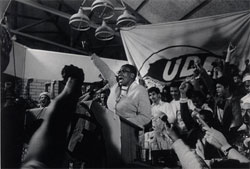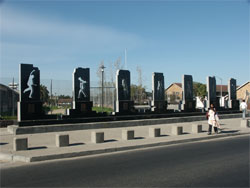 UDF launch at Mitchell's Plain in Cape Town. Source: http://www.nelsonmandela.org
UDF launch at Mitchell's Plain in Cape Town. Source: http://www.nelsonmandela.org
In the late 1970s moves to form united front against apartheid were set in motion. These plans culminated in the formation and launch of the United Democratic Front (UDF) on 20 August 1983 in a community hall in Rocklands, Mitchell’s Plain in Cape Town. Three organizations did not attend the UDF launch, Inkatha, AZAPO and the Independent trade union movement. In early 1983 the UDF leadership sought unions support. (For more history on the UDF, click on the hyperlink above.)
Growing unrest leading to the transition
By the mid 1980s, resistance against the system of apartheid had intensified across the country. Students, community activists and liberation movement cadres launched attacks against the apartheid government. In both coloured and African townships in Cape Town protests and against the government became gathered momentum. The government resorted to declaring a state of emergency in 1985 and using brute force in attempting to quell the rising tide of unrest. Several incidents occurred in the Cape peninsula that demonstrated the government’s determination to use force against political opponents.
Gugulethu Seven
On the morning of 3 March 1986, apartheid security forces led by a Vlakplas based unit of the South African police shot and killed seven members of MK, the armed wing of the ANC. Those who were killed were Jabulani Godfery Miya, Zandisile Zenith Mjobo, Zola Alfred Swelani, Mandla Simon Mxinwa, Themba Mlifi, Zabonke, John Konile and Christopher Piet. They were led into an ambush at the corner of NY1 and NY111 (Native Yard 1 and Native Yard 111) where they were shot and killed. During their funeral a mourners converged carried ANC regalia and release Mandela posters.
In September 1989, Archbishop Desmond Tutu and his wife were arrested together with 30 other protestors in Cape Town during a protest march against security police brutality towards demonstrators outside the St Georges cathedral. In addition another 137 educators and teachers were also arrested for demonstrating earlier in Cape Town.
 Gugulethu Seven Memorial. Source: http://www.dacpm.org
Gugulethu Seven Memorial. Source: http://www.dacpm.org
On the day of the election on 9 September 1989, more than 20people were killed by the police in African townships on the outskirts of Cape Town. An estimated 2 million workers staged a stay a massive stay away in protest against the election. Tutu and Allan Boesak called for a mass protest on 13 September to honour those who were killed by the police. On 13 September, 30 000 people embarked on a peaceful march through the streets of central Cape Town to the balcony of the city hall. Tutu addressed the protestors and confidently expressed his view that the struggle for freedom could not be stopped. The success of the Cape Town protest sparked similar protests in other parts of the country such as Johannesburg, Bloemfontein, East London and Durban.
On 10 October 1989 president F W de Klerk announced the unconditional release of eight key leaders of liberation movements who were imprisoned by the government. The eight prisoners were Walter Sisulu, Andrew Mlangeni, Raymond Mhlaba, Elias Motsoaledi, Wilton Mkwayi, Ahmed Kathrada, Jafta Masemola and Oscar Mpetha.